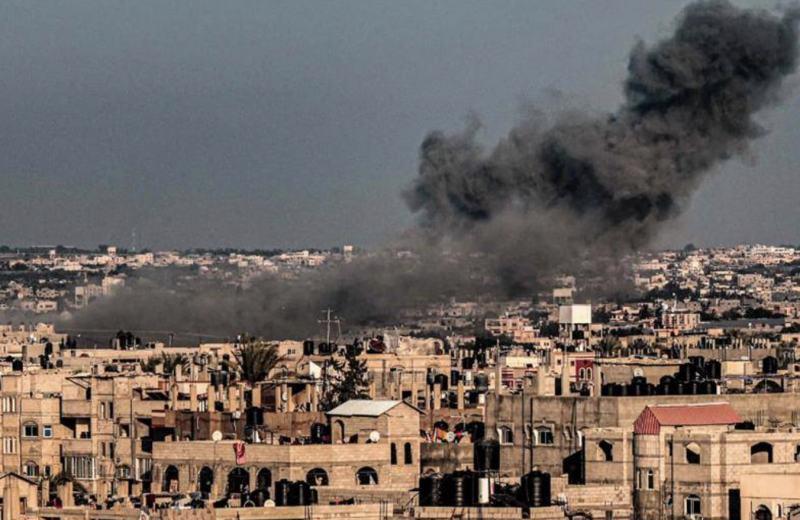
A plume of smoke during an Israeli bombardment of Rafah, in the southern Gaza Strip, on Feb. 11, 2024. (Credit: AFP)
Israeli military officials showed journalists a map of Gaza in red, yellow and green colors. The map illustrates the army’s advancement and supports the argument that it is gradually winning its war against Hamas, the Washington Post reported on Wednesday.
The Israeli armed forces claimed to have dismantled 20 of 24 Hamas battalions, implying that the latter is weakened but still able to fight, as is the case in the north of Gaza.
The last four Hamas battalions are concentrated in Rafah in the south, near the border with Egypt, according to the Israeli army. Rafah is also home to around 1.5 million Palestinian refugees in a dire humanitarian situation, while the imminence of the Israeli offensive is weighing on their safety.
The plan for a Rafah operation seems increasingly clearer by the day, as the government vowed to eliminate the Islamist movement completely.
The Washington Post quoted Israeli officials as saying that the army does not have full control of the Gaza Strip, but has freedom of movement as it is positioned across the length of Gaza’s perimeter and along a newly constructed corridor that divides north from south.
As Israel has gradually reduced the number of its troops in Gaza, observers suggested that it has moved into a new phase of the war, focused on more precise raids aimed at targets where Tel Aviv believes Hamas is regrouping, including al-Shifa hospital in Gaza City.
Although the Israeli armed forces claim to have killed around 10,000 Hamas militants, this does not mean that the movement is not capable of retaliating. Hamas fighters are more inclined to carry out guerrilla hit-and-run strikes with smaller two-to-four-man units, the Washington Post reported.
Yehya Sinwar, the leader of Hamas in Gaza, and Mohammed Deif, the top military commander of the al-Qassam Brigades, are still on the run, probably in Rafah’s underground tunnels.
Immediate cease-fire
Israel seems determined to carry out this operation, which has been internationally criticized, including by the US, which is increasingly voicing its opposition to the plan.
On Monday, for the first time since the start of the war, the US did not veto a UN Security Council resolution calling for an immediate cease-fire. Irritated, Israeli Prime Minister Benjamin Netanyahu answered by canceling the visit of a high-level Israeli delegation to the US capital to discuss the planned operation in Rafah.
However, Israeli Defense Minister Yoav Gallant and his US counterpart Lloyd Austin maintained their meeting in Washington on Tuesday. During this meeting, the US secretary of defense said there is a “moral necessity and a strategic imperative” to protect civilians in the Gaza Strip, where Israel’s military campaign has claimed nearly 32,400 lives, according to Gaza’s Health Ministry.
Faced with international pressure, the Biden administration is urging its Israeli ally to opt for less destructive alternatives to a major offensive on Rafah — a plan that US officials described as disastrous.
Commenting to the Washington Post on the alternatives suggested to the Israelis, a senior US defense official declined to provide details but referred to the sequencing of humanitarian and military operations, increased security at Gaza’s southern border with Egypt and the “precision targeting” of Hamas leaders.
This article was originally published in L'Orient-Le Jour. Translated by Joelle El Khoury.